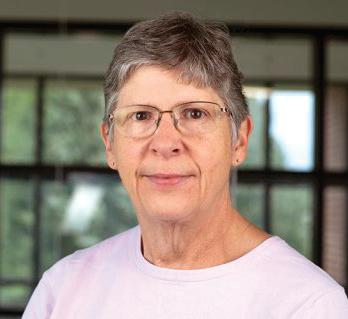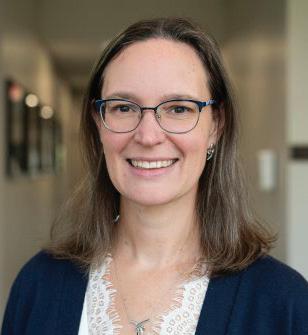MERIDIAN The
FALL 2025 | Volume 2 Issue 2

FALL 2025 | Volume 2 Issue 2
What a wonderful whirlwind the fall has been at the Institute! Our conference in September was very well attended with fascinating presentations and wonderful opportunities for new professional connections to be made. We also held a party to celebrate the 5-year anniversary of the Institute, hired a new graduate assistant and awarded two more undergraduate student scholarships, and released the request for proposals for our next Faculty Research Fellows. Coming up, we are aiming for three educational workshops in the spring and planning to begin discussions of potential curriculum!
From its founding, the Institute was tasked with holding at least one hybrid educational event each semester, open to all. We decided to aim higher and successfully expanded to three events in the spring of 2025. One reason for doing so included, of course, that it enabled us to present a wider variety of topics and reach a greater number of participants. We also received feedback from some attendees that they had somewhat accidentally heard about a single Institute event they attended and had not been previously aware of us or what we do, so we thought we’d enhance our visibility on purpose.
While information on the Institute website has expanded substantially and several new marketing initiatives have been added to publicize the Institute, its mission, and its activities over the past year – including the Meridian newsletter and a social media presence – we felt that increasing the number and frequency of educational events might also help to “keep us on the radar” and encourage people to follow and visit our various information outlets more often to keep abreast of our upcoming activities. We also felt the added diversity of topics of educational events would enable us to reach and engage a more diverse audience of students, members of the public, and practitioners. This, in turn, could then become a feedback loop in the sense that attendees could not only provide invaluable feedback to continually improve and diversify our offerings to meet people’s interests, but in some cases connect us to professionals that might in the future become presenters or even advisory council members! This past fall semester, the conference and the anniversary celebration kept everyone busy enough, but we plan to return to the goal of three events in non-conference semesters.
In addition to the hybrid workshops, we would love to eventually develop and offer academic courses and
programs in integrative healthcare. With the next Institute conference anticipated to be in the 2027-2028 academic year, we have the luxury of a bit more time to undertake what will require robust discussions and active outreach for input and feedback from a range of constituents.
With very early brainstorming barely begun, we envision a variety of potential initiatives available to students across multiple academic years, including graduate level, and perhaps even to working practitioners. We are also open to considering both formal academic curriculum as well as other options at this preliminary stage. It is far too early to have any details in mind, but we share this briefly here to say it is not too early to invite input and insights from interested students, faculty, staff, advisory council members, and both Western and non-Western health and wellness practitioners, and members of the broader community!


We are thrilled to welcome Samantha as the new Graduate Assistant for the Institute for the Study of Integrative Healthcare at Utica University!
Currently in her second year of the Doctor of Physical Therapy program at Utica University, Samantha brings a strong academic foundation in both the sciences and community health. She earned her Bachelor of Science in Integrative Neuroscience from Binghamton University, where she demonstrated an impressive record of leadership, volunteerism, and advocacy for health-related causes.
In her new role, Samantha has already been shaping and sharing the Institute’s story by managing its digital brand strategy and creating engaging content that highlights
ongoing research, community partnerships, and events. She also has redesigned and will maintain the Institute’s database of statewide integrative healthcare practitioners, ensuring that information about New York’s growing integrative health network remains current and accessible. In addition, Samantha helps us support special projects, large-scale events, and faculty research initiatives, contributing to the Institute’s mission of advancing whole-person health and wellness.
Outside of her academic and professional pursuits, Samantha enjoys running and baking and is passionate about advocating, volunteering, and fundraising for health-related initiatives. Her enthusiasm for improving community wellbeing and her creative approach to communication make her a wonderful addition to our team.
Please join us in welcoming Samantha to the Institute! We’re excited to see the innovation, compassion, and energy she’ll bring to her work with us this year.
The Institute for the Study of Integrative Healthcare would like to congratulate our Founding Director and Dean of the School of Health Professions & Education, Dr. Patrice Hallock, on receiving an Outstanding Educator Award at the 19th Annual Genesis Group Celebration of Education ceremony in November.

The events may be over, but their impact lives on — Couldn’t attend one of our recent Institute events? Now you can catch up from wherever you are! Our past programs are available to stream anytime from our website — giving you the chance to relive the moments that inspired us and revisit the conversations that brought new ideas to life. From thought-provoking lectures to engaging activities and inspired panel discussions, you can experience the highlights, insights, and moments worth replaying. Whether you want to revisit your favorite speaker or explore a topic you missed, the
conversation continues online — extending the reach of our events beyond the room and into the community.
Speaker Panel Recordings from 2025 Conference available now to ALL! Our keynote and special interest panel discussion recordings, “Hurdles & Solutions to Healthcare Integration” and “Integrative Approaches to Maternal Health” respectively, are available now to anyone, not just registered conference attendees! Use the link below and find them under the Biennial Conference dropdown menu.

Sound is the brain’s perception of vibrations received by the ear that had traveled through the air or other media by vibrating the molecules. Sound can be a single vibrational frequency, disorganized as noise, or it can be organized into patterns many perceive as music. Music has been a part of human culture for millennia and across ancient and modern times has played a significant role in our wellbeing and our happiness.
Music can instantly cause the listener to begin subtle movements such as tapping their fingers or toes or gently swaying their head, or it can even encourage not-so-subtle movements in the form of full-body dancing which obviously effects health by getting us up moving and exercising! Perhaps this effect is not universal, as not every particular rhythm or melody will be everyone’s cup of tea, but the limitless possible permutations and combinations of musical notes and rhythms ensure there will be some music that will have an effect on everyone. The induced movement may increase heart rate, lubricate joints, increase range of motion, strengthen muscles, and improve balance. With research showing significant negative health impacts of extended periods of sitting, even a modest interruption is helpful in lessening these impacts. For even the more inhibited or restrained among us, music often triggers an emotion, a memory, or even a subtle smile or other facial expression that can then release hormones, thereby affecting health.
Music of varying types may energize or may induce calming. It is very common in gyms, for example, to play rock or pop music to encourage people to invest more effort as they work out, and it is very common in yoga studios to play more mellow music or to have a practitioner play singing bowls to dial down participants’ energy
and emotions as they hurriedly enter from their busy workday or to cap off a practice in a relaxing savasana.
The latter is often expanded upon in the form of extended sound bathing experiences without the yoga asana practice. In this form, the music becomes meditative. The methods of concentration meditation of the Vedic traditions involve focusing on a singularity – in essence, giving the busy mind a single job – as a means to let innumerable other thoughts fade into the background. The chosen single focal point can be nearly anything, from visualizing and feeling one’s breath to gazing at a candle to listening to a particular selection of music. The meditative effect of music has been a keystone of numerous spiritual practices such as reciting prayers in unison in the form of hymns or Gregorian chanting in the Christian traditions or chanting “Om” (or “Aum”) in Buddhist or Hindu meditation.
In addition to music, with its number of varying notes and melodies, research is beginning to explore whether certain specific wavelengths of music played individually may be beneficial. Preliminary work suggests that music with a frequency of 528 Hz, for example, may decrease cortisol and increase dopamine. Many of these early studies, however, are limited in size and have been conducted on animals and need to be both expanded in scale and tested on people.
In addition to its many potential benefits for individuals to explore independently, music, under the guidance of a professional music therapist, can be even more powerful. Beyond its use in generally encouraging movement, it can be useful in physical rehabilitation. Music therapy can motivate people to become engaged in their own physical or mental health treatment and may provide an outlet for expression of challenging feelings and an avenue of communication for individuals who find it difficult to express themselves in words. Additionally, it can provide emotional support for family members of individuals under treatment. Training to become a music therapist consists of coursework in music, psychology, and in the use of music specifically as therapy as well as extensive supervised clinical training. Upon successful completion of an accredited bachelor’s degree, music therapists are eligible to take the national board exam to earn the MT-BC (Music Therapist - Board Certified) credential awarded by the Certification Board for Music Therapists and thereby pursue professional licensing by their state.
The Institute maintains an Integrative Provider Database, featuring a wide range of integrative service providers throughout Oneida County, across New York State, and in select neighboring states. If you’re looking for local whole-person providers, therapists, or other service professionals, you can search the database here or via our website. utica.edu/provider-database
Are you an integrative provider interested in being listed? Submit your information through our provider form—we’d love to include you! utica.edu/provider-signup

ADVISORY COUNCIL MEMBER RESEARCH SPOTLIGHT: Educator Burnout: Can Integrative Healthcare Methods Mitigate the Symptoms? Nicole Scienza, PhD

Associate Professor, Child-Life & Family Science, Utica University, Associate Director, Institute for the Study of Integrative Healthcare
Dr. Nicole Scienza was appointed Associate Director of the Institute in May of 2024 and had previously been a 2022-2023 Institute Faculty Fellow. She joined Utica University’s faculty as an Assistant Professor of Psychology–Child Life in August 2021, completing her full-circle journey from Utica University student to adjunct instructor to internship coordinator. A proud Utica alumna, she earned her bachelor’s degree in psychology before completing both her master’s in Early Childhood Studies and her Ph.D. in Education with a focus on Early Childhood at Walden University. Drawing on her experience in childcare programs and resource agencies, Dr. Scienza’s research explores topics such as preschool expulsion and suspension, the effects of COVID-19 on child care workers and children’s behavior, and integrative healthcare approaches used by families. Her dedication to teaching and advocacy for young children have earned her the Excellence in Teaching Award from Utica University’s National Society of Leadership and Success chapter and the Friends of Children Award from Cornell Cooperative Extension’s Child Care Council.
In the years following the COVID-19 pandemic, research has shown a spike in education faculty and staff burnout and turnover. The reasons for the turnover are complex and multifaceted. Some studies point towards a lack of support for basic health and safety needs of educators and the children for whom they care. One study looked at physical spaces designed for early childhood and noted the lack of adult-sized furniture, especially for older adults who may no longer be able to easily get down to the floor and back up again. In other studies, educators report feeling invisible when their well-being is not prioritized. They report feeling like children’s well-being is a priority while their own is forgotten. This conflicts with the great amount of research over the years that has demonstrated the importance of self-care before being able to care for others. Other recent research has pointed to educators feeling pressure to meet unrealistic expectations to care for children. Finally, a significant amount of research has shown educator burnout correlated with the strength of
relationships with colleagues, parents, and supervisors/ administrators. In addition to looking at possible correlations to educator burnout, it is also important to look at the insight into the impact that burnout has had on education. Research has shown that when an educator feels symptoms of burnout, the children cared for have reduced motivation in the setting and worse academic achievement, as well as lower quality of educator-child relationship. Educator burnout has led to high turnover rates, with educators reporting leaving the profession for lower-paying jobs with less stress. This is also shown to be related to educators not having appropriate coping strategies for the stress that comes with caring for others.
Understanding the problem of burnout is one thing but addressing it is the goal. It’s certainly beneficial to discover a problem, but what a joy to solve it! Research has shown some possible interventions that can mitigate the impact of stress on an educator, such as training educators on how to create relationships with the children in their care, changing the physical environment to accommodate adult needs as well as child needs, and providing counseling and support for mental health. Additionally, there is research that supports the use of mindfulness to help reduce the impact of stress on the relationship between children and educators. Through current research, there is a common theme of reaction to stress and burnout, but less focus on prevention. For an educator to “show up” for the children they are working with, they must first take personal ownership of their mental and physical health and well-being. This is where integrative healthcare modalities can be taught to educators and then supported by administrators, and not just modalities used outside of the classroom on the educator’s personal time, but rather, preparing educators with the skills to use integrative methods within the education environment. This is likely to have a multifaceted impact on a multifaceted problem. One example of research has shown that one of the causes of burnout reported by educators is challenging child behavior. Other related research supports the use of mindfulness, yoga, specific diets and nutrition, forest bathing, animal-assisted therapy, music therapy, martial arts, and other integrative healthcare modalities to teach children how to manage their emotions and to feel a mind-body connection that can help with impulse control. Children who can manage their emotions and control their impulses demonstrate fewer challenging behaviors. These same methods have been shown to have a similar impact on adults, calming the nervous system, lowering cortisol and other stress hormones, and improving focus.
As good as these modalities may sound, the challenge seems to be in the implementation of them in the educational setting. Educators may not be aware of the integrative healthcare methods or feel confident in implementing them in the environment. For others who engage in things like yoga or prayer at home, they may not be comfortable or confident in engaging in them in the workplace with children. Things like in-service days and training offered to educators may teach the importance of things like nutrition and point educators towards a yoga instructor, but fewer opportunities seem to exist that teach how to incorporate some of these integrative healthcare modalities into the existing curriculum, physical environment and daily structure. Before this can be addressed, it is important to first establish which methods are needed most and which have the possibility to be implemented into an existing structure such as education.
The purpose of my current research project is to address the concerns of educator burnout and turnover through the lens of both physical and mental health and wellness opportunities available to child care providers. I chose to begin with child care programs because that is where my passion lies first. As a former family child care provider and child care center staff member and director, I have an understanding of the challenges of caring for young children from infancy through school-age, while also realizing that the majority of research in education is focused on public school. The expectation is to later re-create a similar study in public schools from pre-kindergarten through high school and then begin to look at higher education as well. I have the wonderful opportunity to work with two Utica University students on this project, Andi Spurr and Jessica Bennet, both in the ChildLife and Family Science program.
For this project, we worked with a sample of licensed and registered childcare programs, both childcare centers as well as in-home family and group-family childcare programs in the local Utica area. Through the month of December, we will be collecting qualitative data through focus groups to discuss the physical and mental health and wellness methods currently used for self-care by providers while at work, and present other methods such as meditation, nutrition, yoga, mindfulness, and aromatherapy to gain insight as to what providers feel would be beneficial to them during the workday. During January, we will analyze the data we have to find strong themes and then
conduct a second round of focus groups with child care program directors, administrators, trainers, and licensors to share the results and discuss ways the most commonly mentioned practices might be implemented into programs to identify potential barriers or concerns in implementing, such as taking child care regulations into consideration. This will result in a collection of integrative healthcare methods that could be most beneficial to child care providers and can then be used by licensors and training organizations to teach educators in child care and provide the support needed to implement the strategies, leading to reduced burnout of educators, fewer challenging behaviors of children, and lower rates of turnover. This will strengthen the child care system and, ultimately, our next generation.
data collection process, please reach out—we’d love to
If you or someone you know works in childcare within Oneida, Madison, or Herkimer counties and would like to participate in this research or share insight during the data collection process, please reach out—we’d love to hear from you! The accompanying flier provides more information and the sign up form can be directly accessed here:






The Institute for the Study of Integrative Healthcare is now accepting applications for its Faculty Fellowship Program, which opened in early November. This opportunity is open exclusively to Utica University faculty, although their projects may involve individuals or groups outside of the University. The fellowships support advanced research and creative professional projects that deepen our understanding of integrative health and healthcare. The Institute encourages and places high value on collaborative proposals involving individuals with differing education, training, and expertise – particularly across departments or schools – using innovative ideas that enhance teaching, research, and student experience while fostering partnerships throughout and beyond campus.
These fellowships are designed to afford faculty the time and resources to pursue meaningful inquiry into topics that explore the well-being of the body, mind, and spirit within broader community and societal contexts. Projects may range from basic research that expands fundamental knowledge and understanding, to applied research that employs this knowledge to solve practical problems or to meet needs of specific populations, to other forms of creative scholarship, so long as they contribute to the Institute’s mission of advancing integrative approaches that promote resilience, meaning, and wellness across the lifespan.
A reduction in teaching course load is the intended,
and the preferred, award to faculty fellows to enable more time for the scholarly pursuits. However, in cases for which a reduction of teaching load is not feasible or ideal due to departmental or program course needs, a monetary stipend may instead be awarded to support research during summer or other non-teaching time periods.
Faculty Fellows play an important role in shaping the Institute’s research direction and academic engagement. In addition to conducting their own work, Fellows share their findings through Institute events and updates, helping build a vibrant, interdisciplinary community dedicated to reimagining health. We very much value our Fellows and highlight their work whenever possible throughout and beyond their fellowship season.
Members of the Institute leadership team are happy to make themselves available to answer any questions potential applicants may have. We also plan to schedule Q&A sessions in the early Spring semester to assist applicants with completing their submissions, so please keep an eye out for those announcements in the Utica University Morning Mention!
Interested faculty can visit our website and click “Faculty Fellowships” to find the Fellowship Application details and form link: